Diplomatic Bluebook 2020
Chapter 3
Japan's Foreign Policy to Promote National and Global Interests
5 Japan's Efforts at the United Nations
(1) Japan-UN Relationship
The UN is an international organization with a universal character and nearly all the countries in the world are members (193 countries as of December 2019). With a high level of expertise, it addresses various challenges that the international community faces in diverse areas such as conflict resolution and peacebuilding, counterterrorism, disarmament and non-proliferation, poverty and development, human rights, the refugee problem, the environment and climate change, disaster risk reduction, and infectious diseases.
Japan has been strengthening cooperative efforts through the UN in an effort to make a “proactive contribution to peace” based on the principle of international cooperation, and has been actively working to achieve diplomatic goals not achievable by one country alone. Japan has also served as a non-permanent member of the UN Security Council 11 times, the most frequent among the Member States, fulfilling a key role in the maintenance of peace and security in the international community. Japan also continues to proactively engage in UN reform, including Security Council reform, so that the UN can cope more effectively with the various issues faced by the international community.
In September, Prime Minister Abe and Foreign Minister Motegi attended the high-level week of the 74th session of the UN General Assembly.
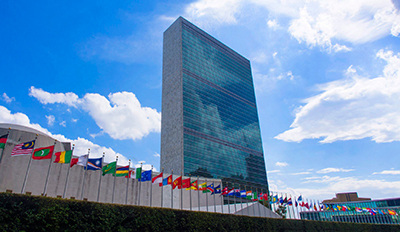 UN Headquarters (Photo: UN Photo/Steven Bomholtz)
UN Headquarters (Photo: UN Photo/Steven Bomholtz)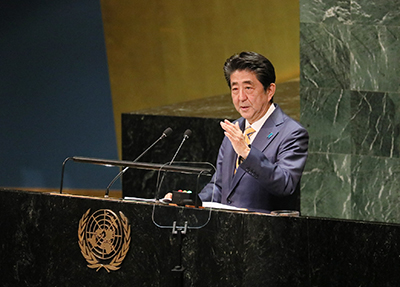 Prime Minister Abe attending a session of the UN General Assembly (September 24, New York, U.S.; Photo: Cabinet Public Relations Office)
Prime Minister Abe attending a session of the UN General Assembly (September 24, New York, U.S.; Photo: Cabinet Public Relations Office)Prime Minister Abe referred to the international events to be held in Japan between 2019 and 2020 at the general debate, including the G20 Osaka Summit, the Seventh Tokyo International Conference on African Development (TICAD7), the Kyoto Congress, and the Olympic and Paralympic Games Tokyo 2020. He also touched upon Japan's contributions to education and the role of women in society, regional situations such as those in North Korea in the Middle East, and the importance of addressing polarization by using multinational frameworks.
Prime Minister Abe attended the UN high-level meeting on Universal Health Coverage (UHC), and made a closing remarks that achieving UHC with the introduction of the national health insurance system provided a foundation for Japan's social and economic development and a healthy aging society. Furthermore, Prime Minister Abe referred to the discussions made at the G20 Osaka Summit and TICAD7, to promote a cross-sectoral approach, combining health development with nutrition, water and sanitation, as well as to strengthen health financing, and emphasized their importance.
At the SDG Summit, Prime Minister Abe shared the progress made in promoting the SDGs over the last four years, including achievements presented during the G20 Osaka Summit and TICAD7. Additionally, as the chief of the SDGs Promotion Headquarters, whose members consist of the Prime Minister and his entire cabinet, Prime Minister Abe introduced the nationally concerted efforts that Japan has made toward achieving the SDGs, including the Japan SDGs Awards32 and the SDGs Future City33 initiatives. He also expressed his intention to show, by December, an “SDGs Model,” by revising the SDGs Implementation Guiding Principles, Japan's mid- to long-term national strategy for the promotion of the SDGs.
Prime Minister Abe also held summit meetings with the U.S., Iran and Jordan, held talks with President-Elect of the European Council Michel (Prime Minister of Belgium) and UN Secretary-General Guterres, and participated in a dinner with European Council President Tusk. In addition, Olympic Committee Chairman Bach and 2018 Nobel Peace Prize laureate Nadia Murad made courtesy calls to the Prime Minister.
In the meeting with Secretary-General Guterres, both sides affirmed the importance of the reform of the UN, including the Security Council, as the UN approaches its 75th anniversary in 2020. There was also an exchange of views on North Korea, during which they affirmed the importance of the full implementation of the UN Security Council resolutions. Furthermore, Prime Minister Abe issued a renewed call for understanding of and cooperation for the prompt resolution of the abductions issue, a call for which Secretary-General Guterres offered his support.
Foreign Minister Motegi, in addition to holding a meeting of the Leading Group on Innovative Financing for Development, attended a total of seven multilateral meetings that included a Japan-Australia-India-U.S. Ministerial as well as the Meeting of the Foreign Ministers of the G4 on UN Security Council reform. 11 Foreign Ministers' Meetings, including between Japan and the U.S. and Japan and China, were held that saw countries' foreign ministers strengthen trust-based relationships with one another through the opportunity afforded by their attendance at the UN General Assembly.
These examples show how Prime Minister Abe and Foreign Minister Motegi took full advantage of the opportunity of the UN General Assembly, where important leaders gathered from around the world, to demonstrate Japan's leadership when it comes to resolving the various challenges confronting the international community. In addition, they also vigorously engaged in bilateral talks with leaders from different countries in aiming to strengthen bilateral relations, and assertively conveyed Japan's policies and positions to the international community.
UN Secretary-General Guterres visited Japan twice this year, in June and August. During his visit in June, his third visit to Japan since becoming Secretary-General in January 2017, he attended the G20 Osaka Summit. During his meeting with Prime Minister Abe on the fringes of the Summit, the Prime Minister indicated his intention to continue taking concrete steps toward solving global problems, including achieving the SDGs, for which Secretary-General Guterres expressed his support, and emphasizing the importance of initiatives to address climate change. Prime Minister Abe indicated that Japan would make every effort possible to support the Secretary-General's initiatives on UN reform and peacebuilding, to which Secretary-General Guterres expressed his gratitude. The leaders exchanged views on regional situations such as North Korea and shared the view on the need to ease tensions over the Iran situation.
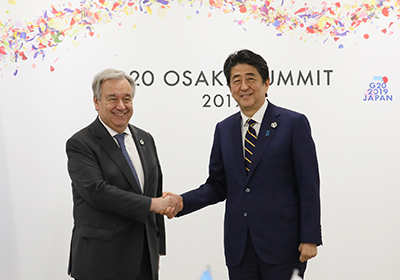 Prime Minister Abe shaking hands with UN Secretary-General Guterres (June 28, Tokyo; Photo: Cabinet Public Relations Office)
Prime Minister Abe shaking hands with UN Secretary-General Guterres (June 28, Tokyo; Photo: Cabinet Public Relations Office)Secretary-General Guterres visited Japan again in August for TICAD7 and held talks with Prime Minister Abe. Prime Minister Abe indicated that he would support Africa's initiatives to achieve peace and stability, a major theme of TICAD7, and expressed his intention to provide all possible support for Secretary-General Guterres' initiatives, which center on sustaining peace. The two affirmed their intention to continue making efforts in these areas. Secretary-General Guterres highly commended Japan's support efforts for Africa.
At the end of July, the President of the 74th session of the UN General Assembly Muhammad-Bande visited Japan prior to assuming presidency in September. Along with a courtesy call to Prime Minister Abe, President-elect Muhammad-Bande exchanged views with Foreign Minister Kono on global issues that included the reform of the UN Security Council, the situation of North Korea, SDGs, climate change, marine plastic litter, and health.
- 32 Awarded to companies and groups taking exemplary initiatives toward achieving the SDGs
- 33 The cities selected propose exemplary initiatives toward achieving the SDGs through local governments
(2) United Nations Security Council and its Reform
A United Nations Security Council
The UN Security Council holds the primary responsibility within the UN for maintaining international peace and security. Its activities, including Peacekeeping Operations based on UN Security Council resolutions, are diversifying, and the Council's role has been expanding year by year, encompassing the efforts to address new threats such as the proliferation of weapons of mass destruction and terrorism.
Japan served as a non-permanent member of the UN Security Council for the 11th time from January 2016 to the end of December 2017. It has served more frequently than any other UN Member State and has contributed proactively to discussions on topics such as country-specific situations and peacebuilding. During its 11th term on the Council, Japan made every effort to resolve North Korea's nuclear and missile issues, including contributions to drafting the six UN Security Council resolutions adopted in response to North Korea's repeated ballistic missile launches and three nuclear tests conducted in January and September 2016 and September 2017. At the UN Security Council Briefing on Non-proliferation/Democratic People's Republic of Korea in December 2019, Japan was fully engaged in discussions related to maintaining international peace and security by stating that North Korea's ballistic missile launches were in violation of relevant UN Security Council resolutions and posed a serious challenge not only for Japan but also for the international community as a whole, as well as calling for the importance of the full implementation of relevant UN Security Council resolutions.
B Reform of the UN Security Council
In the almost 75 years since the UN was established, the structure of the international community has changed significantly while the UN's functions have grown increasingly diverse. Despite this, the composition of the UN Security Council has basically remained unchanged to this day. There is broad recognition of the necessity for promptly reforming the UN Security Council in a way that reflects the reality of the international community in order to improve its legitimacy, effectiveness, representativeness, and transparency.
Japan has contributed proactively to the international community in areas such as disarmament and non-proliferation, peacekeeping and peacebuilding, and human security, among others. To play an even more proactive role toward the realization of world peace and security through the UN, Japan has been making efforts to convince other countries to pursue the early realization of UN Security Council reform, with the expansion of both permanent and non-permanent seats and Japan's admission as a permanent member.
C Recent Activities Regarding UN Security Council Reform
Since 2009, in the UN General Assembly, Member States have been engaging in the Intergovernmental Negotiations on UN Security Council reform. At the Intergovernmental Negotiations during the 73rd session of the General Assembly (held a total of five times from January to June, 2019), the Co-chairs (UN Permanent Representatives of the United Arab Emirates and Luxembourg) worked to revise the document from the previous session based on the comments made by each country and group. The decision to pass on the existing documents, which include the document compiled at the 73rd session, to the 74th session (from September 2019 to September 2020) was adopted by consensus at the UN General Assembly in June 2019.
President of the 74th session of the UN General Assembly Tijjani Muhammad-Bande reappointed the UN Permanent Representative from the United Arab Emirates to continue serving as a Co-Chair of the Intergovernmental Negotiations, as a carryover from the 72nd session, while also appointing the UN Permanent Representative from Poland to serve as a new Co-Chair of the Intergovernmental Negotiations.
In addition, Japan also places great importance on strengthening its initiatives as a member of the G4 (Japan, India, Germany, and Brazil), a group that cooperates on promoting UN Security Council reform. Foreign Minister Motegi attended the Meeting of the Foreign Ministers of the G4 countries that was held on the margins of the UN General Assembly High-level Week in September 2019. At the meeting, to achieve progress for the current session, the ministers agreed to improve the process of the Intergovernmental Negotiations, coordinating with UN General Assembly President Tijjani Muhammad-Bande. They also agreed that the G4 countries, given their capacity and willingness to take on responsibilities with regard to the maintenance of peace and security, will cooperate closely and continue their engagement with like-minded countries, including those in Africa, as the 75th anniversary of the UN in 2020 approaches. Japan will continue to engage proactively in the process for realizing UN Security Council reform, in close cooperation with reform-oriented countries.
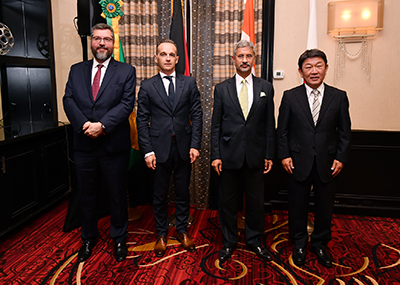 Meeting of the Foreign Ministers of the G4 countries (Japan, India, Germany, and Brazil) on UN Security Council reform (September 25, New York, U.S.)
Meeting of the Foreign Ministers of the G4 countries (Japan, India, Germany, and Brazil) on UN Security Council reform (September 25, New York, U.S.)(3) Administrative and Budgetary Issues of the United Nations
A Budget of the United Nations
The UN budget is mainly composed of the regular budget, which is a biennial budget for the period from January to December of the next year (an annual budget from January to December of the same year will be implemented on a trial basis from 2020 to 2022), and the peacekeeping budget, which is an annual budget for the period from July to the following June.
With regard to the regular budget, a budget for 2020 amounting to approximately 3.1 billion US dollars was approved in December 2019 at the UN General Assembly. The budget for peacekeeping operations for the period of 2019-2020 amounting to approximately 6.52 billion US dollars in total was approved in July 2019 (a decrease of approximately 8% from the final budget of the previous period).
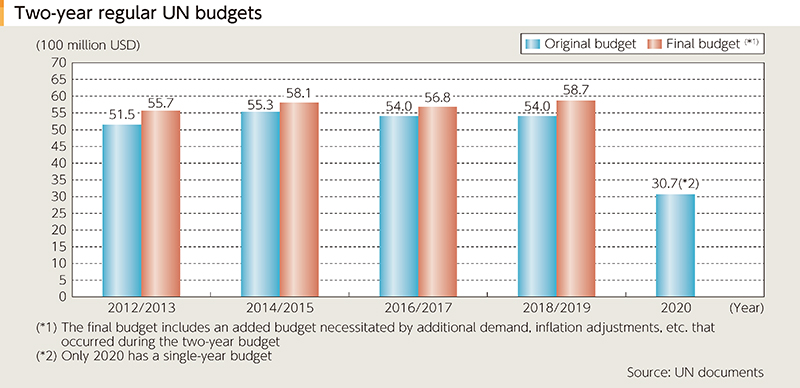
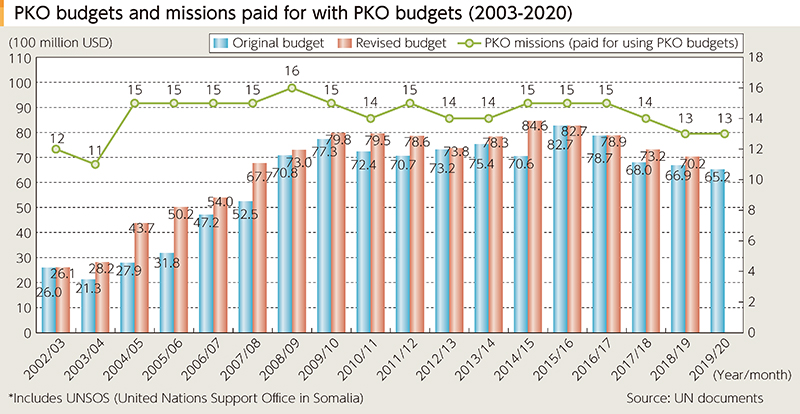
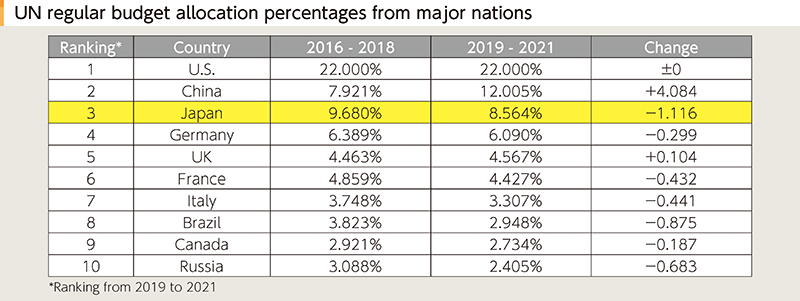
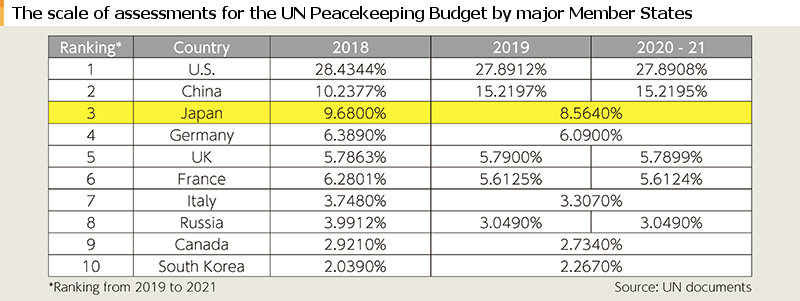
B Japan's Contribution
The UN budget, which supports the activities of the organization, is composed of assessed contributions duly paid by Member States and voluntary contributions paid in accordance with Member States' policy needs. With regard to the assessed contributions, Japan contributed approximately 238.8 million US dollars to the UN regular budget for 2019, ranking third after the U.S. and China. Its contribution to peacekeeping operations for 2019 was approximately 814.3 million US dollars, again ranking third after the U.S. and China. As a major financial contributor, Japan has been encouraging the UN to make more efficient and effective use of its resources.
UN Secretary-General Guterres places priority on the management reform of the UN, along with addressing issues related to peace and development, and is engaged in efforts to further enhance the efficiency and effectiveness of the functions of the Secretariat. Japan, while supporting the objectives of the reform, is urging the UN to advance its reform without additional financial burdens to Member States in light of their difficult financial circumstances. Based on the General Assembly resolution adopted at the end of December 2017 on the policies for management reform, a new organizational structure was launched in January 2019. It is expected that, under the new structure, the financial, budgetary, and human resource management of the UN will be made more efficient.
